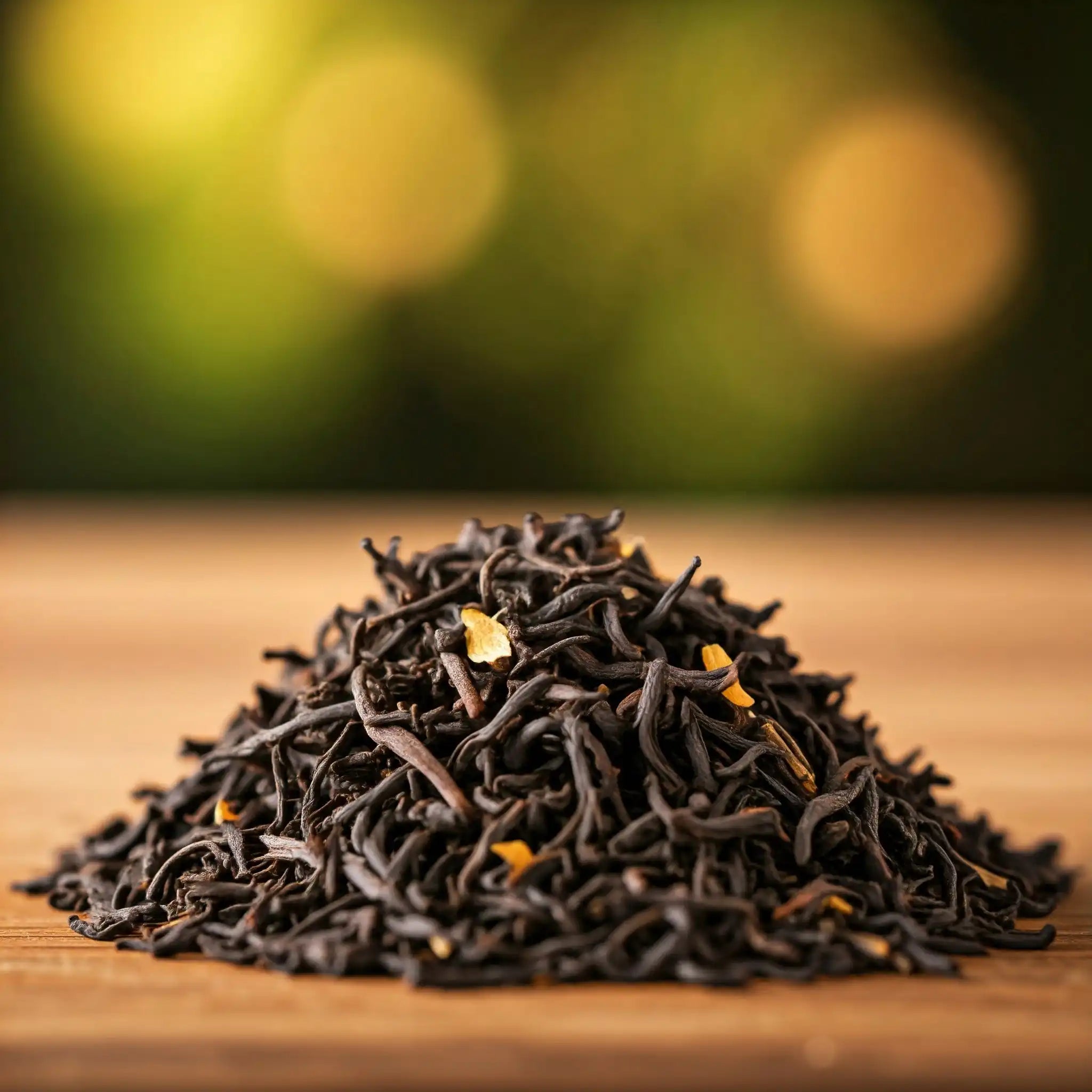Hey, tea friends! Ever picked up a box of “orange pekoe black tea” and wondered, “What exactly does that mean?” You’re not alone! The name sounds fancy, but it has nothing to do with oranges. Let’s break it down in simple terms so you know exactly what you're sipping on. Grab a cozy spot, and let’s dive into the world of orange pekoe black tea.
What is orange pekoe black tea?
Despite what the name suggests, orange pekoe doesn’t mean the tea tastes like oranges. Instead, it’s a grading term used to describe the size and quality of the black tea leaves. The word "orange" might refer to the tea’s coppery color when brewed or have historical ties to the Dutch royal family, the House of Orange. But it doesn’t change the fact that orange pekoe black tea refers to a high-quality tea made from whole, unbroken leaves.
How is orange pekoe black tea made?
Like all black teas, orange pekoe comes from the Camellia sinensis plant, but the care in selecting and grading the leaves makes it special. Here’s a quick breakdown of the process:
-
Harvesting: Only the youngest, top leaves and buds are picked, ensuring a high-quality tea.

-
Withering: The leaves are left to wither, softening them for rolling.

-
Rolling: The leaves are rolled to release enzymes and prepare them for oxidation.

- Oxidation: The leaves are allowed to oxidize, which is what gives black tea its deep, rich color and bold flavor.
-
Drying: Finally, the leaves are dried to lock in their flavor.

What you get is a robust, full-bodied black tea with a complex flavor profile. It’s one of those teas that’s perfect for any time of day.
What does orange pekoe black tea taste like?
If you’re wondering about the taste, orange pekoe black tea offers a smooth, balanced flavor that’s both rich and refreshing. Here’s what you can expect:
- A malty base with a slight sweetness
- Hints of floral or citrusy notes, depending on where it’s grown
- A slightly astringent finish that keeps the flavor crisp
It’s not overpowering, which makes it perfect to enjoy on its own or with a splash of milk. It’s versatile—whether you prefer it straight or dressed up with a little sugar.
The grading system: what does orange pekoe mean?
When it comes to tea grading, orange pekoe is all about leaf size and quality. You might also see some variations like broken orange pekoe or flowery orange pekoe:
- Orange Pekoe (OP): Whole, unbroken leaves of high quality.
- Flowery Orange Pekoe (FOP): Whole leaves with some buds, giving the tea a slightly more delicate flavor.
- Broken Orange Pekoe (BOP): Smaller, broken leaves. This grade is often found in tea bags, but still packs a punch when it comes to flavor.
These grades help identify the type of leaves you’re getting, but each one has its unique flavor and quality.
Health benefits of orange pekoe black tea
Beyond its rich flavor, orange pekoe black tea is packed with health benefits:
- Antioxidants: Like other black teas, orange pekoe is full of antioxidants that help protect your body from cell damage.
- Heart health: Drinking black tea regularly can help reduce the risk of heart disease by lowering blood pressure and cholesterol.
- Digestive aid: The tannins in black tea can help soothe digestion, making it a great choice after meals.
- Boosts energy and focus: Thanks to its moderate caffeine content, orange pekoe tea offers a gentle energy lift without the jittery feeling of coffee. Plus, it contains L-theanine, which promotes a calm focus.
So, if you’re looking to support your health while enjoying a flavorful cup of tea, this might be the one for you.
How to brew the perfect cup of orange pekoe black tea
Brewing orange pekoe is simple, but a few tips can make sure you get the best flavor:
- Start with fresh water: Always use cold, fresh water for the best-tasting tea.
- Measure your tea: Use about one teaspoon of loose-leaf tea (or one tea bag) per cup.
- Water temperature: Bring water to a full boil, then let it cool for about 30 seconds before pouring it over the tea leaves.
- Steep time: Let the tea steep for 3-5 minutes, depending on how strong you like it.
Once brewed, you can enjoy it plain or add a splash of milk and a bit of sugar for a classic twist.
Final thoughts: why you should try orange pekoe black tea
So, now you know what orange pekoe black tea is all about. Despite its fancy name, it’s a smooth and satisfying black tea that’s enjoyed by tea lovers around the world. Whether you like your tea bold and strong or mellow with milk, orange pekoe is a versatile option that’s perfect for your daily tea ritual.
Next time you’re in the mood for a classic cup, reach for some orange pekoe and savor its balanced, full-bodied flavor. Trust me—it’s worth a sip!




